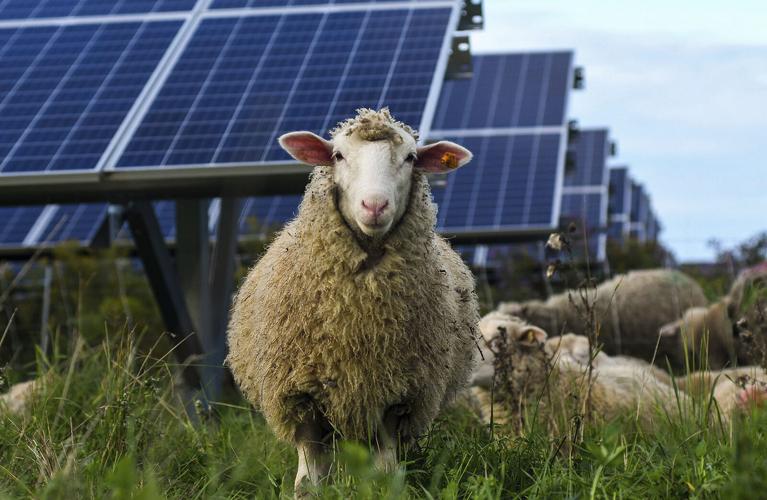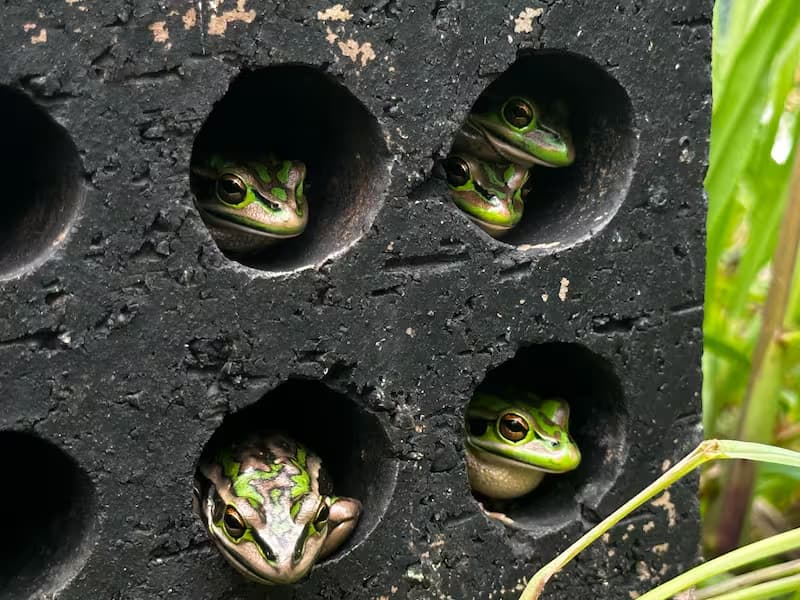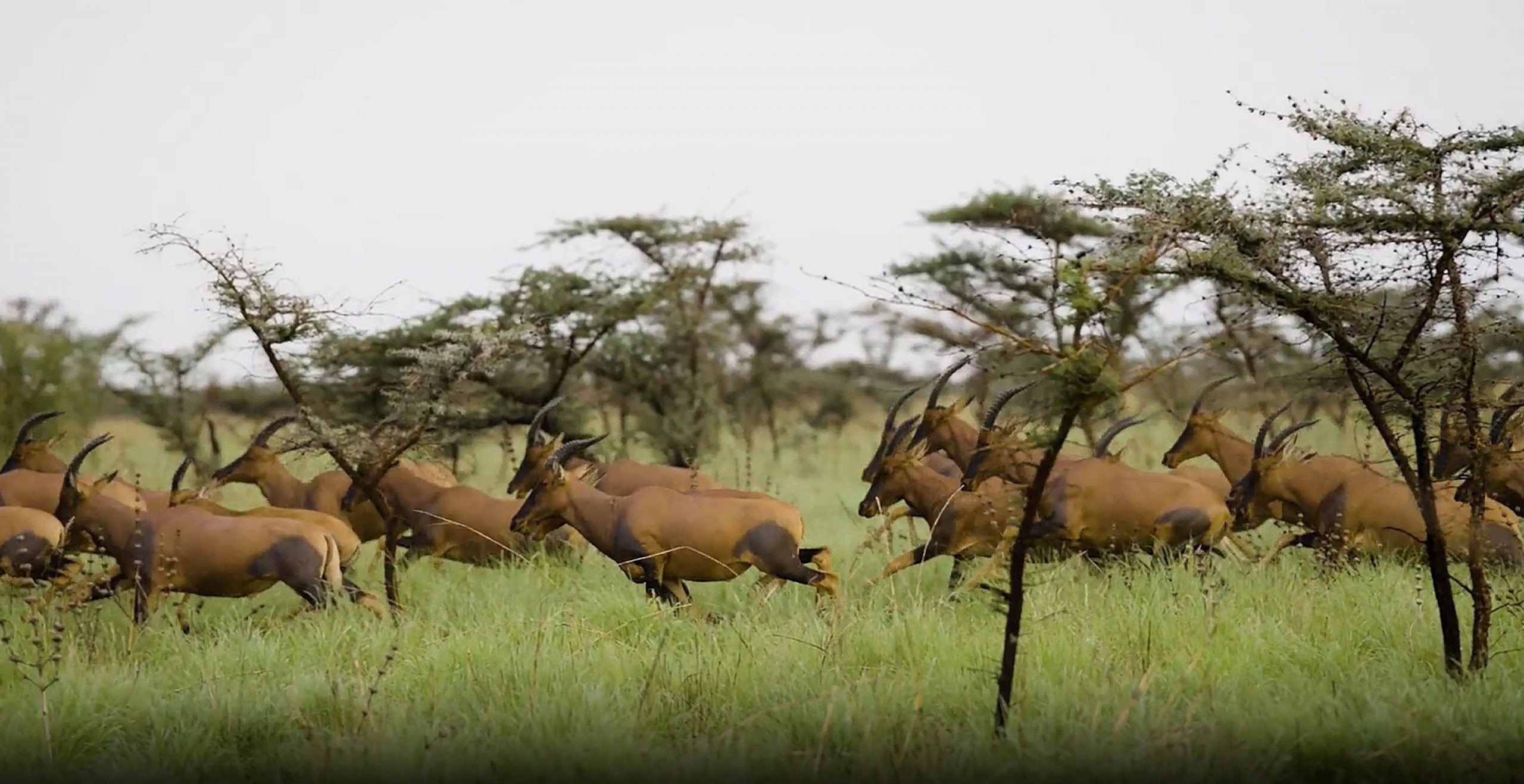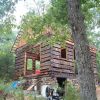
Living
Solar Panels & Sheep – A Great Pairing
Installing solar panels in grazing fields benefits both sheep and the environment. Farmers can increase the efficiency of their land while also providing a comfortable environment for their sheep by incorporating solar panels into grazing fields.
Sheep are known to graze on vegetation, thereby creating a natural land maintenance system. They do, however, require shade and protection from the elements. Farmers can create a shaded area for their sheep to rest and protect them from the sun and rain by installing solar panels in grazing fields. This not only makes the sheep more comfortable, but it also aids in stress reduction, which can improve their overall health and well-being.
Solar panels in grazing fields can also help farmers save money on electricity costs. Farmers can reduce their reliance on the grid and lower their energy bills by producing their own electricity. They can also sell any excess energy back to the grid, increasing their profits even further.
The incorporation of solar panels into grazing fields benefits the environment as well. Solar energy is a clean, renewable energy source that does not pollute the environment. Farmers can reduce their carbon footprint and contribute to climate change mitigation by producing their own energy.
Living
New ‘Butter’ Made from CO2 Could Change Food Production

A new type of butter that doesn’t need animals or farmland might soon be available in the US. This innovation, created by the start-up Savor, uses carbon dioxide (CO2) to make a vegan fat. This could help reduce carbon emissions and protect rainforests.
Savor’s “butter” is made in a way similar to how fossil fuels are processed, not food. Kathleen Alexander from Savor says, “There is no biology involved in our specific process.” This butter doesn’t need animals, fertilizers, hormones, or antibiotics. It’s real fat, not a substitute, so it carries the same calories and flavor without the environmental drawbacks.
Savor’s method involves taking CO2 and adding heat and hydrogen to create fat chains. These are then mixed with oxygen from the air to produce fats and oils similar to those we use in cooking. This process avoids the use of animals, palm plantations, and harmful chemicals, making it an efficient and eco-friendly method.
Savor is working with chefs to create recipes using this new butter. They are offering samples to professional chefs and bakers to test in their kitchens. This innovation could change how we make milk, ice cream, cheese, meat, and tropical oils.
Bill Gates, who supports Savor, highlights the benefits of this new butter in a blog post. He explains that the process does not release greenhouse gases, uses no farmland, and requires very little water. Importantly, it tastes like real butter because it chemically is.
Cows produce a lot of methane, a powerful greenhouse gas. According to UC Davis, cattle are the largest agricultural source of greenhouse gases, contributing to 14.5% of global emissions. While there are dairy alternatives like margarine, these often rely on plant oils, which still need land and resources to grow. Palm oil, for instance, has been linked to deforestation and biodiversity loss.
Savor’s butter stands out because it doesn’t require the plants, animals, or chemicals used in traditional fat products. So far, Savor has raised over $33 million from investors like Breakthrough Energy Ventures and Climate Capital. The company hopes to bring its butter to the market soon and is also exploring making other products like milk, cheese, and tropical oils.
This new butter could be a big step towards more sustainable food production, offering the same taste and quality without the environmental impact.
Living
Tiny Saunas Help Frogs Fight Deadly Fungus

A little heat might be the answer to help frogs fight a dangerous fungal infection.
Researchers have found that tiny brick saunas, warmed by the sun, can help green and golden bell frogs battle chytrid fungus. This fungus has been a major problem, causing declines in at least 500 amphibian species, including these frogs, which have disappeared from much of their natural habitat in Australia.
Chytrid fungus thrives in cooler temperatures but can’t survive above 86°F. Frogs, however, prefer slightly cooler temperatures, around 84°F, which still isn’t ideal for the fungus. Infection rates go up in winter when it’s colder.
Anthony Waddle, a conservation biologist at Macquarie University in Australia, wanted to see if warmer shelters could help frogs fight off the fungus. He and his team set up 12 outdoor habitats, each with water, fake plants, and black masonry bricks inside little greenhouses. Some habitats had only healthy frogs, while others had a mix of healthy and infected frogs. Half the shelters were shaded, and the other half were left in the sun to test different temperatures.
The frogs quickly made themselves comfortable in the saunas. When it was about 68°F to 77°F outside, the unshaded bricks provided an extra 15 to 20 degrees of warmth. The shaded shelters were about 4.5 degrees cooler than the unshaded ones.
Frogs in the warmer, unshaded shelters had higher body temperatures and milder infections over the 15-week study. Even shaded saunas helped infected frogs fight the disease, increasing their survival rate to be similar to that of healthy frogs.
Frogs that overcame the infection were less likely to get sick again. The study found that frogs that had fought off the fungus before were 23 times more likely to survive a reinfection.
These saunas could be a big help for bell frogs and other urban-dwelling amphibians. “Bell frogs used to live in people’s toilets and letterboxes and everywhere before chytrid,” says Waddle. “Creating these warm habitats might help them increase their numbers again.”
The shelters are cheap and easy to build, so frog enthusiasts could set them up in their gardens, says Erin Sauer, a disease ecologist at the University of Arkansas.
However, not all frog species will benefit from these warm hideouts, cautions Cori Richards-Zawacki, an amphibian biologist at the University of Pittsburgh. Some species that like cooler environments, like the Panamanian golden frog, might not find these saunas helpful and could even become more vulnerable to the fungus at higher temperatures.
“Chytrid is a massive problem,” Waddle says. While the study doesn’t offer a complete solution, it does provide some hope.
Living
South Sudan’s Major Effort to Protect World’s Largest Mammal Migration

South Sudan is working hard to protect the largest land mammal migration in history. The country has teamed up with the nonprofit African Parks to safeguard the many species that depend on this ecosystem.
The migration helps animals like the white-eared kob, tiang, Mongalla gazelle, and bohor reedbuck survive seasonal changes. The goal of the partnership is to protect up to six million animals on the east bank of the White Nile, a tributary of the Nile River.
Despite facing challenges like flooding, famine, and a recent civil war, many animals have survived by following ancient migration routes. They travel through “No Man’s Land,” vacant areas left by indigenous tribes for the animals to pass through. In 2022, African Parks and South Sudan signed a 10-year agreement to manage Boma National Park and Bandingilo National Park, both located in these areas, to help protect the species.
Researchers knew about the migration but didn’t understand it well. To learn more, African Parks, South Sudanese students from Juba University, and local people conducted aerial surveys over six months in 2023. They collected data daily, counting and identifying each species. They found that the animals moved in a circular route influenced by rainfall, as they searched for water resources.
David Simpson, park manager for African Parks, shared his experience from one of the surveys. “We flew for the first 30 to 40 minutes, and we didn’t see anything. I was like, ‘Oh, no, maybe it’s over. Maybe the wildlife has already disappeared,'” he told ABC News. “Then we get out there and we start hitting one, two, three, four. Then we start hitting hundreds and then we start hitting thousands, and then tens of thousands, then hundreds of thousands.”
To better understand the animals’ movements, African Parks began collaring species involved in the migration, as well as giraffes, lions, Nile lechwe, elephants, and cheetahs. Last year, rangers collared 126 animals across different species, and this year they collared 127, with plans to increase the number each year.
South Sudan is home to seventeen ethnic groups, each relying on the animals for clothing, shelter materials, medicine, and cultural traditions. They see the migration as a sacred symbol of abundance and prosperity. The communities are also working with African Parks to learn conservation measures that reduce threats to wildlife.
“Most people view the migration as something that has been going on for centuries,” Anthony Abang John Urbano, a member of the Bahr el Ghazal tribe, told ABC News. Urbano has worked as a backseat observer during the aerial surveys and continues to work as a control operator with African Parks. “When it comes to some specific communities, [the migration is] a mystery, but they all are benefiting from the same migration — it’s a mutual benefit,” he said.
African Parks has hired many indigenous members to help bridge the gap between conservation and the needs of local communities. Together, they work to raise awareness about animal conservation and involve the community in preserving the ecosystem.
“They are really proud that we are exposing that natural resource, especially the wildlife under conservation of South Sudan,” said Juanna Kenneth Ali, a member of the Moru tribe and a technician for African Parks. “They are really proud that I am part of a group who did great work exposing our nature to the world.”
As South Sudan faces increasing human development, including road construction and bushmeat poaching, the sustainability of wildlife and ethnic communities is threatened. African Parks predicts that without continued partnership and education on conservation, the animals could disappear within five to ten years. However, they stress that conservation must be balanced with tourism to help boost the economy.
“When it comes to understanding the wildlife and interacting with communities, human development can only lead to a sign of an animal losing its natural behaviors and, some suggest, losing agility,” noted Mapour Kuot Mungu, a control operator for African Parks’ South Sudan team and a member of the Bahr el Ghazal tribe. “With time, these animals become vulnerable to practices being caused by humans.”
Living
Basketball Star in the Making: One Man’s Amazing Journey

Nkwain Kennedy Lamiress is chasing his basketball dreams all the way from Cameroon, Africa. He’s become famous on social media for his hard work and positive attitude. Even NBA players are taking notice!
Kennedy doesn’t have fancy equipment or courts to practice on. Instead, he uses what he can find – stairs, tires, and bottles. He shares videos of his training on TikTok and Instagram, where millions of people follow him.
“I’m going to say something that’s hard to hear. You’ll have to let people underestimate you,” Kennedy says in one of his popular videos. He believes in himself, even when others don’t.
Kennedy’s dedication has caught the eye of some big names in basketball. NBA champion Stephen Curry started following him online. Another player, Lamar Odom, was so impressed that he sent Kennedy new shoes and basketballs.
Every day, Kennedy wakes up early to do chores. Then he walks 25 minutes to a clay court where he practices for hours. After that, he lifts weights in a homemade gym.
Making it to the NBA is incredibly hard. Less than 1% of all basketball players in America make it. The odds are even tougher for someone from another country. But Kennedy isn’t giving up.
Life in Cameroon isn’t easy. The country has been at war for years, and many people live in poverty. Sometimes Kennedy has to stop practicing and run for safety when there’s fighting nearby.
Despite these challenges, Kennedy stays positive. He wants to inspire other kids in Cameroon. “It doesn’t matter where you come from, you can achieve what you want,” he says.
Kennedy often posts inspiring messages online. Some of his favorites are:
- “Believe in yourself and you will be invincible.”
- “Change will not come if we wait for some other person or some other time.”
- “Quitting is not an option. I will keep working till I become better at this.”
Kennedy shows that with hard work and a good attitude, you can chase your dreams no matter where you’re from or what obstacles you face.
Living
Anglers Take Action: Buying a River to Save Endangered Salmon

Alarmed by dwindling salmon populations, a dedicated group of anglers in Scotland has taken a bold step. The Blairgowrie Rattray and District Angling Association (BRDAA) recently purchased a four-mile stretch of the River Ericht, a vital spawning tributary for the River Tay system.
The Ericht, flowing through the town of Blairgowrie, has seen a concerning decline in salmon stocks. The BRDAA blames factors like historical water extraction for industry and low water levels. These conditions make upstream migration difficult for salmon, already stressed and vulnerable to predators.
“Salmon stocks are falling across Scotland,” said Grant Kellie, a BRDAA member and representative of the Scottish Gamekeepers Association’s fishing group. “Rod catch numbers are at a record low.” He pointed to water abstractions – diversions for mills and fish farms – alongside aging Victorian weirs as culprits disrupting water flow, especially during dry periods.
The BRDAA is no stranger to conservation efforts. For years, their members have participated in river cleanups, planted trees, and managed invasive species. Owning this section of the river strengthens their position when advocating for change.
“This is not just an issue on the Ericht,” Kellie emphasized. “Many Scottish rivers face similar challenges, hindering the migration of these crucial fish.” He called upon the Scottish government to take decisive action and implement effective strategies to protect salmon. “The current national strategy isn’t working,” he declared. “With salmon now endangered, time is running out for this iconic species.”
Despite the challenges, the BRDAA remains hopeful. Early signs are encouraging, with 38 salmon caught and released this year during the spring run – a key spawning period. They believe their expanded control over the river will provide valuable data to support their lobbying efforts.
The BRDAA’s initiative has garnered praise. “They deserve great credit for taking this critical step,” said George Thomson of the SGA Fishing Group. “This demonstrates their deep passion for salmon and their commitment to this way of life.”
The Scottish government has yet to comment on the BRDAA’s actions, but one thing is clear: these determined anglers are taking matters into their own hands to ensure the future of salmon in the River Ericht.
-

 OMG6 years ago
OMG6 years agoA Couple Gave Birth to the Most Beautiful Twins Ever
-

 OMG6 years ago
OMG6 years ago20 Rare Historical Photos
-

 OMG6 years ago
OMG6 years agoHilarious Airport Photos
-

 Cute6 years ago
Cute6 years agoMom Refuses to Let Daughter Eat Sugar and Years Later This is What She Grows Into
-

 OMG6 years ago
OMG6 years agoTop Secret Air Force One Facts That You Never Knew
-
OMG6 years ago
The Funniest Yearbook Photos Of All Time
-

 OMG6 years ago
OMG6 years agoRetired Mathematician Restores Log Cabin
-

 OMG5 years ago
OMG5 years agoWhat Happened When This ‘Duck Dynasty’ Legend Chopped Off His Beard?